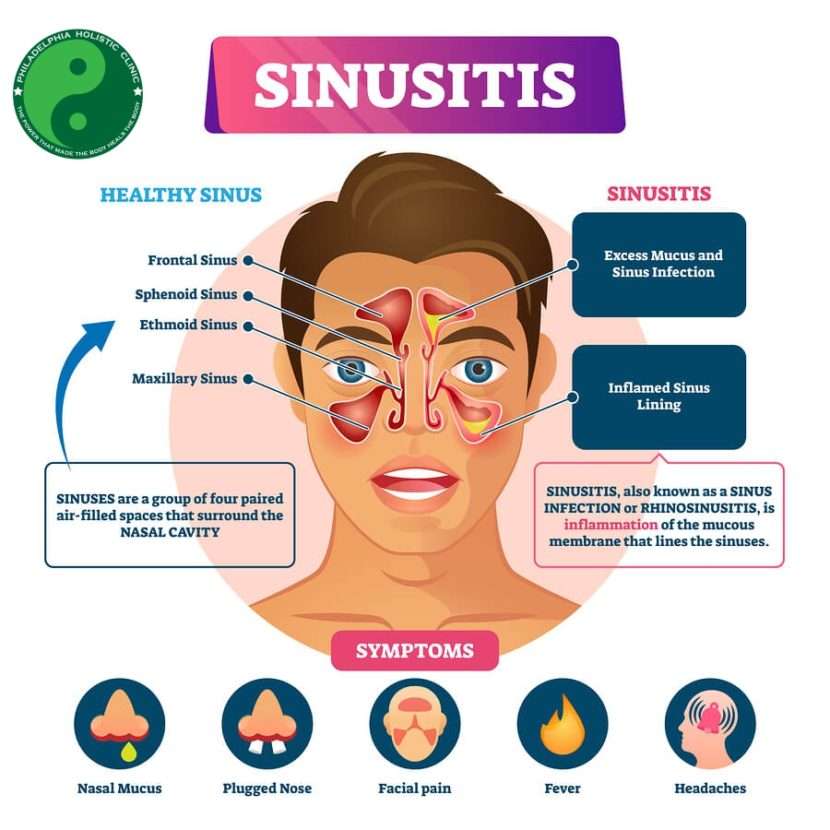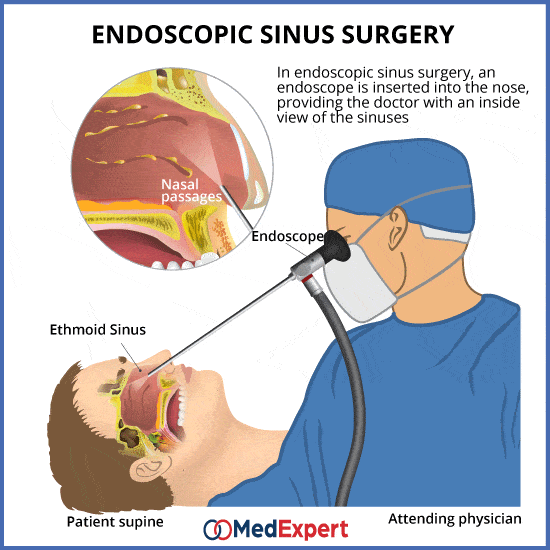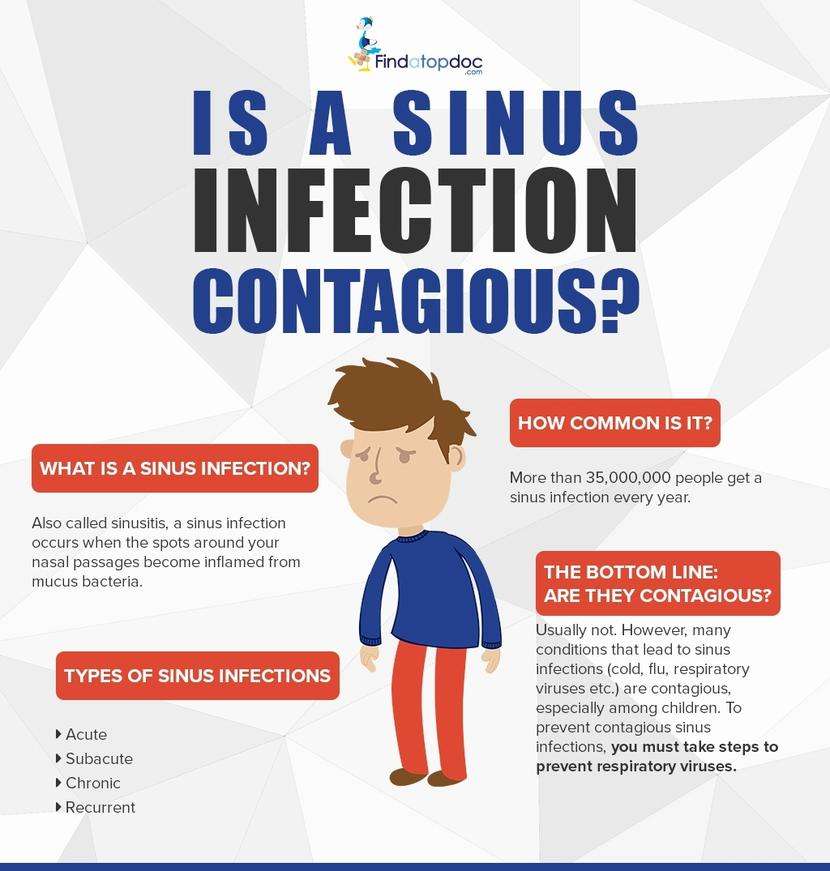When Antibiotics Dont Work
Have an infection that isnt responding to antibiotics or sinusitis that has more than two weeks? Youre experiencing a unique sinus infection that could cause more serious complications.
Depending on your specific case, a CT scan can help. This gives health care providers a closer look at what is occurring in the sinuses. You may also benefit from an otolaryngology specialist, who can determine whether other issues are causing your ongoing sinusitis.
Should the root of your sinus infection remain a mystery, additional tests can pinpoint the exact cause. If bacterial, your primary care provider may prescribe you a specific antibiotic. Fungal infections are rare and need to be treated surgically.
Some Steps You Can Take
Whether your sinus infection turns out to be viral or bacterial, you can help to ease your symptoms early on with supportive sinus care:
If your symptoms arent improving after one week, its important to see your doctor. If a bacterial infection is suspected, youll probably need to take an antibiotic to clear up the infection and prevent further complications.
If your infections occur more frequently, and your doctor really wants to establish if they are bacterial or viral, your Otolaryngologist or ear, nose and throat doctor can sample the snot from your nose when youre infected and send it to a laboratory to know for sure.
Note: Antibiotics wont help a viral infection, and taking an antibiotic unnecessarily can do more harm than good. You risk possible side effects and increase your chances of developing antibiotic resistance, which can make future infections harder to treat, says Dr. Sindwani. So its important to wait and see how long your symptoms last.
Natural Remedies For Chronic Sinus Infections
Natural remedies for sinus infections may not fully cure your symptoms, but they can work to reduce them. Examples of these approaches include:
- Drinking plenty of fluids.Fluids help to thin out mucus, which makes it easier to pass through your sinus passages. You know youre drinking enough when your urine is pale yellow.
- Applying warm compresses. Create a warm compress using a soft washcloth and warm water. These compresses help to open your sinus passages and soothe swollen facial tissues to make breathing easier.
- Using a neti pot. A neti pot is an alternative to saline nose sprays. You can buy these at most drugstores and online. They look like a small tea pot with an elongated spout. You fill the pot with sterile water, insert it into one nostril, and pour in the water so it comes out the other nostril. Here are step-by-step instructions.
In addition to these measures, its important to get plenty of rest. Getting enough sleep at night enables your body time to heal and maintain a healthy immune system.
Taking steps to keep your nasal passages draining well can help you avoid sinus infections. Examples of healthy habits to practice include:
You can also ask your doctor for additional prevention recommendations that target the cause of your sinus infection.
You May Like: Natural Treatment For Tooth Infection
What Causes A Sinus Infection
In most cases, acute sinusitis is caused by a bacterial or viral infection, which means it usually develops after youve had a cold or the flu. Its possible for an acute sinus infection to develop into a chronic infection over time. However, most chronic sinus infections are caused by:
- Problems with the physical structure of your sinuses such as nasal polyps, narrow sinuses, or a deviated septum
- Allergies such as hay fever that cause inflammation
Certain health conditions are also known to accompany chronic sinusitis. These include:
- Primary immune deficiency disesase
The Right Way To Treat A Sinus Infection

5 min Read Time
Your head is throbbing, especially around your eyes. You cant stop coughing, and for some reason, your breath is terrible. Blowing your nose is a mess.
Bad news: You could have a sinus infection. Most frequently triggered by the common cold, over 30 million American adults are diagnosed with sinusitis yearly.
So, what exactly are sinus infections? How can you tell if you have one? And holy cow how can you feel better as quickly as possible?
Read Also: What Antibiotic Is Used For Dental Infection
Er For Severe Sinusitis Symptoms
While sinusitis can be managed at home, you might wonder when to see a doctor for a sinus infection.
You must go to an ER doctor for immediate medical treatment if you experience severe symptoms like difficulty breathing and unbearable pain.
Doctors will have to quickly examine to assess what proper antibiotics to give you to alleviate the pain and help you recover fast.
If you are in Kingwood, Texas, go to Kingwood ER to get the best medical treatment in an instant.
Categories
Check If You Have Sinusitis
Sinusitis is common after a cold or flu.
Symptoms of sinusitis include:
- pain, swelling and tenderness around your cheeks, eyes or forehead
- a reduced sense of smell
- green or yellow mucus from your nose
- a sinus headache
Signs of sinusitis in young children may also include irritability, difficulty feeding, and breathing through their mouth.
The sinuses are small, empty spaces behind your cheekbones and forehead that connect to the inside of the nose.
Sinusitis causes the lining of the sinuses to swell up.
This stops mucus draining into your nose and throat properly, making you feel blocked up.
Also Check: Which Monistat Is Better For Yeast Infections
Things To Know About A Sinus Infection
- Sinusitis or sinus infection is inflammation of the air cavities within the passages of the nose.
- Sinusitis can be caused by infection, allergies, and chemical or particulate irritation of the sinuses.
- The fastest way to get rid of a sinus infection can include medications, home remedies, alternative therapies, and surgery.
- Most people do not spread sinus infections to other people.
- Sinusitis may be classified as acute sinus infection, subacute sinus infection, chronic sinus infection, infected sinusitis, and noninfectious sinusitis.
- Sinusitis signs and symptoms include
- cloudy discolored nasal or postnasal drainage,
- the feeling of nasal stuffiness,
What To Do For Chronic Sinusitis
If youre suffering from chronic sinusitis or you are getting frequent sinus infections you should see your doctor, says Dr. Sindwani.
Your doctor will swab your nose to collect mucus. Culturing it in a laboratory will reveal which type of bacteria is causing the infection so the right antibiotic can be prescribed.
Treat early sinus infection symptoms with rest, hydration and over-the-counter sprays and decongestants. But dont look for an antibiotic unless your illness extends beyond a week, he says. Then check in with your doctor for a prescription and let him or her know if your condition worsens.
You May Like: Blood Test For H Pylori Infection
What Are The Treatment Options
Sinusitis is treated differently based on the cause. Most cases of acute sinusitis, about 98 percent, are caused by a virus, not bacteria, and should not be treated with antibiotics. Acute viral sinusitis may be treated using pain relievers such as acetaminophen or ibuprofen, steroid nasal sprays, or salt water irrigation in the nose. These treatments are also good options for acute bacterial sinusitis. Most people get better naturally from acute bacterial sinusitis, called watchful waiting, but some patients with acute bacterial sinusitis may get better faster with an antibiotic.
Chronic sinusitis is treated differently than acute sinusitis. Because chronic sinusitis is caused more by inflammation than infection, the treatments for chronic sinusitis aim to control the inflammation. Salt water nasal irrigation and/or nasal steroid sprays are the main treatments for the symptoms of chronic sinusitis. Antibiotics may sometimes be helpful but not always.
Other factors, including allergies, nasal polyps, asthma, and problems with the bodys ability to fight infections, can go along with sinusitis and make it worse unless they are also treated.
X-rays or CT scans of the sinuses are not necessary to diagnose uncomplicated sinusitis if you have the symptoms of sinusitis . If your doctor suspects a complication or if you have repeated episodes or prolonged sinus symptoms, a CT scan of your sinuses may be needed.
Surgery
css id:
Sinus Surgery For Chronic Infections
If medical therapies dont clear up chronic sinusitis, your doctor will usually recommend surgery.
Several surgical approaches can enlarge the sinus cavities to make breathing and drainage easier. In the past, sinus surgeries required bone and tissue removal. Recent advancements mean this isnt the case.
Also Check: Urinary Tract Infection Vs Chlamydia
What Causes Sinus Infections
Sinus infection is a common illness and can happen to anyone.
Over 31 million people have sinusitis in the United States. However, you have a higher risk of developing sinusitis if you have conditions such as nasal polyps, asthma, allergies, and abnormal nose structure.
Sinusitis develops when fluid clogs the sinuses, causing viruses and bacteria to form and swell.
These are what causes sinus infections:
How Can I Prevent Sinusitis

Some of the home remedies used to treat sinus infections symptoms may help prevent sinusitis. These include rinsing your nose out with salt water and using medications that your provider might suggest, such as allergy medications or steroid nasal sprays.
You should avoid things you are allergic to, like dust, pollen or smoke, and try to avoid sick people. Wash your hands to reduce your chance of getting a cold or flu.
Also Check: Can I Use Vagisil Wash With A Yeast Infection
How A Sinus Infection Is Diagnosed
The diagnosis of a sinus infection is usually based on symptoms and a physical exam. If your symptoms don’t improve with treatment, you may need X-rays or a CT scan. Sometimes a sample of sinus fluid may be taken for microscopic exam and culture .
Though not all sinus infections require treatment, early diagnosis and treatment can help you feel better sooner and potentially prevent the infection from progressing.
Pain Or Pressure In Your Sinuses
Facial pain is a common symptom of sinusitis. You have several different sinuses above and below your eyes, as well as behind your nose. Any of these air-filled cavities can hurt when you have a sinus infection.
Inflammation and swelling can cause your sinuses to ache with dull pressure. This is because inflammation may alter the typical path of mucus from the nose to the back of the throat.
You may feel pain in:
- on either side of your nose
- in your upper jaws and teeth
- between your eyes
This may lead to a headache. Headaches caused by sinus infections can occur where the sinuses are or in other places.
Also Check: Homeopathic Remedy For Bladder Infection
Sinus Infection Treatment At Home
It isnt possible for you to tell at home if sinusitis is caused by a bacteria, virus or fungus, but there are some steps you can take to help relieve sinus infections symptoms. They include:
-
Moisturizing the room air with a humidifier or vaporizer
-
Increasing your fluid intake to ensure you are well hydrated
-
Using saline sprays or nasal irrigations
-
Using nasal spray decongestants for 2 or 3 days at the most
-
Applying warm compresses to your face to help relieve pain and pressure
-
Sleeping with your head elevated. If sleeping on a pile of pillows isnt comfortable, place blocks under the two legs at the head of your bed to elevate it.
-
Taking over-the-counter pain relievers, such as ibuprofen or acetaminophen
How Is Sinusitis Treated
Sinusitis is treated in several ways, each depending on how severe the case of sinusitis is.
A simple sinusitis infection is treated with:
- Drinking fluids .
If symptoms of sinusitis don’t improve after 10 days, your doctor may prescribe:
- Oral or topical decongestants.
- Prescription intranasal steroid sprays. .
Long-term sinusitis may be treated by focusing on the underlying condition . This is usually treated with:
- Intranasal steroid sprays.
- Topical antihistamine sprays or oral pills.
- Leukotriene antagonists to reduce swelling and allergy symptoms.
- Rinsing the nose with saline solutions that might also contain other types of medication.
When sinusitis isn’t controlled by one of the above treatments, a CT scan is used to take a better look at your sinuses. Depending on the results, surgery may be needed to correct structural problems in your sinuses. This is most likely to happen if you have polyps and/or a fungal infection.
Also Check: Urine Infection Not Getting Better With Antibiotics
How You Can Treat Sinusitis Yourself
You can often treat mild sinusitis without seeing a GP by:
- getting plenty of rest
- taking painkillers, such as paracetamol or ibuprofen
- avoiding allergic triggers and not smoking
- cleaning your nose with a salt water solution to ease congestion
If you have a high temperature or you do not feel well enough to do your normal activities, try to stay at home and avoid contact with other people until you feel better.
You do not need to use all of the solution, but make a fresh solution each time you clean your nose.
When Antibiotics Are In Order
The main reason to prescribe antibiotics is for patient comfort, Dr. Sindwani says. The medical field used to be more convinced than it is today than untreated sinusitis would inevitably become a chronic issue, he says.
We dont think that way as much, he says. We dont know that an untreated acute sinusitis, if left untreated, will grumble along and cause people to have a chronic sinus infection.
Some people think thats two separate things, with chronic sinusitis more likely due to underlying issues like allergies or immune problems.
You May Like: What Essential Oil Is Good For Tooth Infection
How To Treat A Sinus Infection
You know how to treat a cold, but this seems like something else. That runny nose, facial pain, headache and sore throat just wont go away and you may also have bad breath and a cough. You go to the primary care provider and learn its not a cold its a sinus infection. What does that mean and how do you treat it?
Treatments For Sinus Infections Other Than Antibiotics

#1: Saline Nasal Wash
Saline nasal wash can be a great way to thin out the mucous in the sinuses enough to clear out the blockage. I recommend starting this early on in the course of the illness to prevent the infection from worsening.
You can even make this at home using 2 cups of water and a 1/2 teaspoon of salt. I would add a 1/2 to 1 teaspoon of baking soda to prevent burning that can occur with use. There are also plenty of over the counter saline nasal sprays that you can purchase. You can use this 4-6 times per day.
#2: Vaporizer
Vaporizers are great because they can also thin out the mucous and make you feel a lot better. An easy home remedy, steam is probably the best way to use this treatment. Beware if you are an asthmatic as the steam could cause worsening of the asthma symptoms.
#3: Steroid Nasal Spray
Steroid nasal sprays such as Flonase have been my go to remedy recently and the great news is that they are now over the counter. The general recommendation is to use 1-2 sprays per nostril daily.
But I have found great relief using 2 sprays in each nostril twice daily. At these higher doses it is important to remember that you should use this short term, no more than 5-7 days.
These medications can significantly reduce inflammation allowing the congestion blockage to clear and significantly alleviate symptoms.
#4: Decongestants
#5: Guaifenesin
Guaifenesin such as Mucinex can certainly break up the mucous, allowing the congestion to clear more quickly.
Don’t Miss: What To Do If Infected With Ransomware
Is It Possible To Prevent Sinus Infections Or Sinusitis
Currently, there are no vaccines designed specifically against infectious sinusitis or sinus infections. However, there are vaccines against viruses and bacteria that may cause some infectious sinusitis. Vaccination against pathogens known to cause infectious sinusitis may indirectly reduce or prevent the chance of getting the disease however, no specific studies support this assumption. Fungal vaccines against sinusitis are not available, currently.
If you are prone to recurrent bouts of a “yearly sinus infection” it may be important to consider allergy testing to see if this is the underlying cause of the recurring problem. Treatment of the allergy may prevent secondary bacterial sinus infections. In addition, sinus infections may be due to other problems such as nasal polyps, tumors, or diseases that obstruct normal mucus flow. Treatment of these underlying causes may prevent recurrent sinus infections.
Health Solutions From Our Sponsors